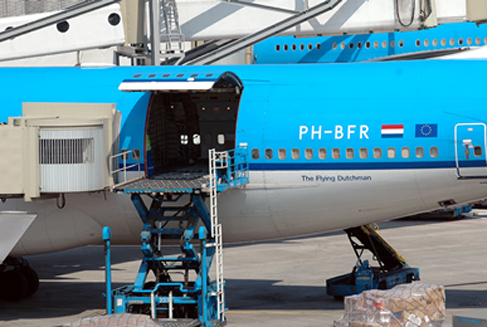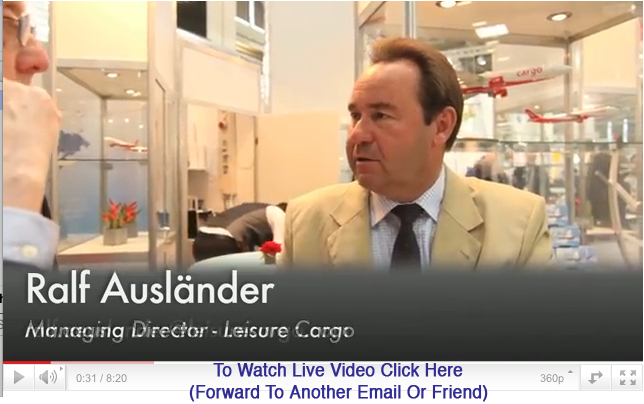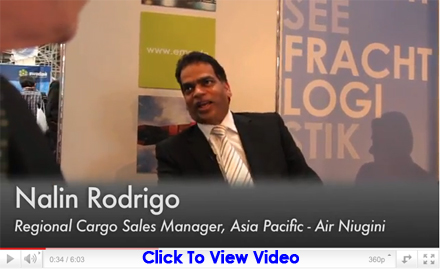|  RE:
Ditch
Belly Lift Sez DJ RE:
Ditch
Belly Lift Sez DJ
 Dear
Geoffrey: Dear
Geoffrey:
I was intrigued by your Ditch Belly
Lift American Friendship story and the commendable contributions
to our collective air cargo intellect offered by Mr. D. J. Ghosh.
The air cargo business is a multi-faceted
transport discipline, and to an extent unique in the fact that it is
almost entirely demand derived.
I do recall a vertical integration exception
back in the early nineties as KLM's GM for Saudi Arabia/Yemen.
I was based in Dharhan, headquarters of
the legendary oil field development behemoth, ARAMCO.
The consortium purchased and operated
their own aircraft to ferry people and materials (cargo) to and from
their far flung drilling sites on the Arabian Peninsula.
This is one example of how I have come
to view the business of air cargo on an equal footing as the transport
of people, viz. passengers.
It is probably not politically correct
to label people as cargo, albeit they do eventually convert to that
nomenclature human remains, but in the core sense there is a similarity
if one views moving people by air as an exercise in placing a corollary
value on time and space.
KLM had it right mixing people with cargo
on its DC-8 & B-747 "Combi" main decks, separated only
by a flimsy "bulkhead."
 |
So, what's the difference?
Even fish may apply as the time in '83
that we loaded onto a 747 Combi aircraft six-foot lemon sharks originating
off the coast of Florida.
They were at home in electrically aerated
sea water contained in specially built glass tanks fastened onto the
main deck floor of the jumbo, just behind the passenger compartment
on a flight from Atlanta to Amsterdam.
The live cargo was destined for an aquarium
in Holland.
I like to say there was a group of lively
bankers flying up front, or "loan sharks."
Whether it be piranhas, people, pharmaceuticals,
air transport is the selling of time within a space assigned a specific
dollar value return, i.e. profit.
As Southern Region Cargo Director for
KLM in the early eighties, I presented a case where the company made
more money carrying cargo in the winter -- off-season for passenger
traffic -- than flying low fare "ski groups" and their wares.
The dollar value of filling the belly
with general cargo was higher compared to the stowing of bulky, volumetric
skis and ancillary luggage coupled by the fuel expending weight of the
low yield passenger.
It was pure arithmetic in how best to
maximize the value of time and space among the animate and inanimate
commodities offered.
Applying similar metrics in the Middle
East, to the pleased astonishment of the cargo manager, I once gave
the order to reduce the passenger count of a weight sensitive DHA-AMS
flight in favor of moving a large shipment of fresh tomatoes tendered
in ULDs... harvested from the desert, too!
By the nineteen-eighties, the legacy U.S.
carriers had missed their mark by not paying attention to cargo, literally
giving away the business to those who cared: the intermediaries, or
cargo agents (forwarders) that launched their own fleets, followed by
the so-called integrators.
U.S. airlines were managed by passenger
minded "travel" executives giving short shrift to cargo.
Much to the detriment of air cargo logistics
development, their best talent was elevated to the hierarchies of the
organization where passengers were the meat and potatoes, and cargo,
gravy.
Now they are hungry for cargo.
In a commentary from this past week's
edition of Aviation Week, George Hamlin quotes a statistic
from the U.S. Transportation Department that beginning in the late 1990s,
the legacies no longer covered total operating expenses with their passenger
revenues.
Since none of the legacy carriers operate
freighters, and domestic cargo revenues in particular have been decimated
by the ascendency of the U.S. integrators (FedEx and UPS), an inability
to cover the expenses of running a passenger-oriented network with passenger
revenues helps to explain the legacies' recent interest in ancillary
fees and charges.
In context to time tested horizontal integration
of premium space and time, the next time a baggage fee is assessed,
one may consider, as with the live passenger, a suitcase is actually
freight in disguise worthy of an uplifted price tag when properly loaded
in the appraised speedy space of flight.
Don Palmer
KLM GM (ret.)
Don Palmer, Director Business Development Cargo, Gate Safe, Inc.
dpalmer@gatesafeinc.com
www.gatesafeinc.com
Dear Don,
Thanks for writing.
I loved your letter.
 It brought back so many special memories
including KLM Combi flights when with a couple of Geneevers under our
belts we would slide into cargo to see what was up and label the trip
"research". Like the time whilst everyone on the maindeck
was eating dinner, we chatted up the handlers as they fed the horses
at the same time and loved the juxtaposition.
It brought back so many special memories
including KLM Combi flights when with a couple of Geneevers under our
belts we would slide into cargo to see what was up and label the trip
"research". Like the time whilst everyone on the maindeck
was eating dinner, we chatted up the handlers as they fed the horses
at the same time and loved the juxtaposition.
Later when I created "True Blue”
the story of KLM Cargo for Jacques Ancher as a 200-page picture book
that was printed in Dutch & English, those happy days and many others
shared with KLMers like Jan Kok, Henry Kluck, Jan Meurer, Leo van Wijk
and Pieter Bouw and others in cargo were recalled to bring the story
alive.

Jan Meurer
|

Jacques Ancher
|

Pieter Bouw
|

Leo van Wijk
|
I never thought as that time flew
by that one day these memories would resurface with such fondness and
downright emotion.
But that is exactly what has happened.
So thanks again for sharing and hope to
see you soon.
Your friend,
Geoffrey
Dear Geoffrey,
I don’t often feel the urge to react
to somebody else’s opinions in print, but I do feel that our friend
DJ Ghosh’s remarks must be put into context. I do not agree with
much in the article you published, but I do see, like him, immense opportunities,
downturn or no downturn.
For the rest, he seems to be advocating
the integrator model as a panacea for our industry. While I am a great
admirer of the achievements of the integrators, and the great solutions
and innovations they have brought to their countless customers, it is
obvious that the market share of the forwarder/airline combination continues
to be dominant for the simple reason that it can provide the diversity
of solutions and reach that shippers require. In other words, the integrators
have not come in and eaten the cake of the forwarder/airline combination,
the cake has grown exponentially and both models find ample opportunity
for sustainable and profitable growth. In fact, integrators make ample
use of forwarders’ and airlines’ services to complement
their own offer to their customers.
Regarding the even more extravagant claim
that belly capacity should be abandoned in favor of freighter capacity,
I ask our friend to consider a world in which countless long-haul passenger
operations would be cancelled due to the missing revenue and profit
streams, or DJ (and all his fellow travellers) would find their tickets
exorbitantly expensive, setting the industry back several decades to
when air travel was a luxury few could afford. Or in which shippers
and forwarders would be deprived of half the excellent solutions they
have today for their sophisticated supply chains. Or in which twice
as many aircraft would need to take off into the sky to accommodate
the freight that was previously transported in bellies, thereby hugely
exacerbating environmental impact, congestion, and many other problems.
I for one prefer not to contemplate such
a world, and I am proud to be the leader of a passenger airline that
treats cargo as a core and essential business, to the benefit of our
shareholders, customers and the global economy.
Best regards
Oliver
Oliver Evans
Chief Cargo Officer
Swiss International Air Lines Ltd.
Dear Oliver,
Hope that all is well.
It cannot be said of you that you do not
write thoughtful letters!
DJ enjoys omnipresence at almost every
air cargo trade show I have ever heard of, from Nairobi to AMS to China
to Sao Paulo.
We can figure most of our opposite number
at these gatherings based on who they are, where they work and what
they think and say.
In DJ’s case, I am not absolutely
sure what he does aside from think big thoughts about air cargo and
share the same with lots of industry stakeholders.
I imagine he does some consulting, although
I’m fairly certain that not many belly carriers will be seeking
his advice.
But we are glad DJ is out there as mentioned,
at times in the air, everywhere.
Makes for a better Masala, I say.
Super Summer 2011!
Your friend,
Geoffrey
RE: German
Security Gets Lift
Geoffrey:
At a time when the TSA is under fire
for their body searches of 90-year olds, nuns, the handicapped and even
6-year old children, doesn't it make sense to follow Germany's lead
and offer these screen jobs to our Veterans, supplemented by active
servicemen and women?
Immediate benefits would be a far more
educated and experienced workforce, guaranteed employment for retiring
and returning veterans and I would imagine a huge reduction in the associated
cost.
Andy
Andrew Titley, Managing Director
Albion Group of Companies
www.AlbionGroup.com |



